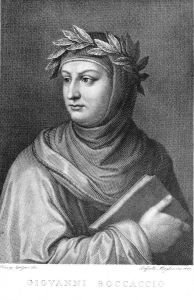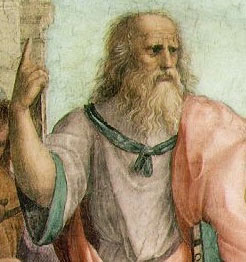It’s vital that all authors find their own voice and strive toward a creative approach to their story. However, it’s also a little ridiculous to believe that all works of fiction must be entirely new and original. For instance, I grew a little nervous when a friend compared the magic system in my book to alchemy in Fullmetal Alchemist. But then, after considering historical precedent, I relaxed. After all, many of the great storytelling franchises relied heavily on past works. Here are three:

The Works of William Shakespeare
Assuming you believe Shakespeare existed (If you don’t, keep that opinion to yourself. This is a bard-friendly blog.), you are probably familiar with the fact that he did “borrow” the plots of most of his plays from other writers. One of those writers would be Geoffrey Chaucer. Like Shakespeare, Chaucer also borrowed many of his plots from other writers, including an Italian poet called Giovanni Boccaccio. A good example of this borrowing can be seen in Shakespeare’s play, Troilus and Cressida. Shakespeare’s plot was heavily influenced by that of Chaucer’s Troilus and Criseyde, which itself was influenced by Boccaccio’s Il Filostrato. So, even the great writers of history have stolen from each other from time to time.

The Lord of the Rings
Sometimes seen as the father of high fantasy, J.R.R. Tolkien is much loved and respected by readers the world over. I, too, love Tolkien; The Hobbit was one of the very first chapter books I ever read. It’s also well known that Tolkien based much of his world building on pre-existing cultures on Earth. Mythology too played a huge influence on Tolkien’s writing, a good example of which is displayed in Tolkien’s favorite plot device, The One Ring. Tolkien based his ring heavily off of Plato’s Ring of Gyges, a mythical artifact that turned the wearer invisible. Furthermore, the Ring of Gyges sparks a debate in Plato’s works between Socrates and another; they argue over whether that power would always be taken advantage of by the wearer, or if a just person could withstand it and resist his base desires. It’s pretty easy to see the link between the corruption of the Ring of Gyges and that of The One Ring; the biggest difference is that no one can resist The One Ring forever.

Star Wars
A cultural touchstone in its own right, many modern works owe a great deal to the Star Wars franchise. However, like the previously mentioned franchises, Star Wars owes much to other works. What resonates most with many fans of the original films was the blending of familiar elements (plots structures, character types) with futuristic settings. George Lucas pulled those familiar elements from mythology from around the world. For Luke’s journey in particular, Lucas relied heavily on the works of Joseph Campbell. And, lest I forget, I feel I should also mention the Japanese film The Hidden Fortress, directed by Akira Kurosawa. This film is told primarily from the perspective of two bickering peasants (not so different from C-3P0 and R2-D2), and also features a battle-hardened warrior (like Obi Wan Kenobi) and a rebellion-leading princess (like Princess Leia).
While I want my books to feel fresh and original, I also have to be aware that borrowing from other works is not a sin. I do feel, though, that I should be aware of my influences. One thing I do admire about George Lucas is that he has never shied away from giving credit to his influences. If nothing else, it’s a good way to introduce younger audiences to time-tested works.
How do you guys feel about borrowing from works? Should it be frowned on, or celebrated? Is there a line between the two, and when have you seen it crossed?
4 responses to “Creative Theft: 3 Great Writers Who Stole Their Best Ideas”
In my mind, Eragorn is one of the worst offenders in terms of “Creative theft.” (Spoiler alert?) The story is so blatantly using the plot of Star Wars, character for character, plot point for plot point, that I had figured out a big plot twist long before any solid hints had been given.
LikeLike
ERAGON! I AM YOUR BROTHER!
NOOOOOOOOOOOO
LikeLike
I’m having that problem with my current series. What really sucks is when you honestly did come up with the idea originally and then you find out part way through the process how very very very like something that already exists it is.
Mine is Avatar the Last Air Bender. I actually started watching that show because of NaNoWriMo. I already had the plot to Lands of Ash (humans vs fire elementals) roughly sketched out along with skeleton “plots” for at least two books (one focused on water elementals, another on earth) . . . when I decided I needed something new and exciting to occupy my kids during writing sessions. Something quality . . .So I was flipping through the offerings of our Amazon Fire Stick and ooh, Avatar. Everyone who has ever told me about this show has raved about it.
So I turn it on for my kids and I’m like, “Huh. . . there are a lot of ideas in this that I’m clearly echoing . . . Oh well, still some differences. . .”
Then we got to the episode about the library. My original plan for book two involved the characters needing to find a library that had been hidden in an underground bunkers to protect it from the rampaging fire elementals during the war. They’d find it only to have the Elementals follow them there and burn it to the ground (inspired the the Library of Alexandria) . . .
There is an Avatar episode that is so like that plot idea that I’ve sort of put it aside until I can find some more tricks to differentiate.
LikeLike
I am unabashedly, 100% pro-stealing. I own Austin Kleon’s book “Steal Like An Artist,” and follow him on Tumblr as well, and he’s got a lot of great things to say about the concept of “stealing” other people’s work. There is nothing new under the sun: you just have to make it your own.
LikeLike